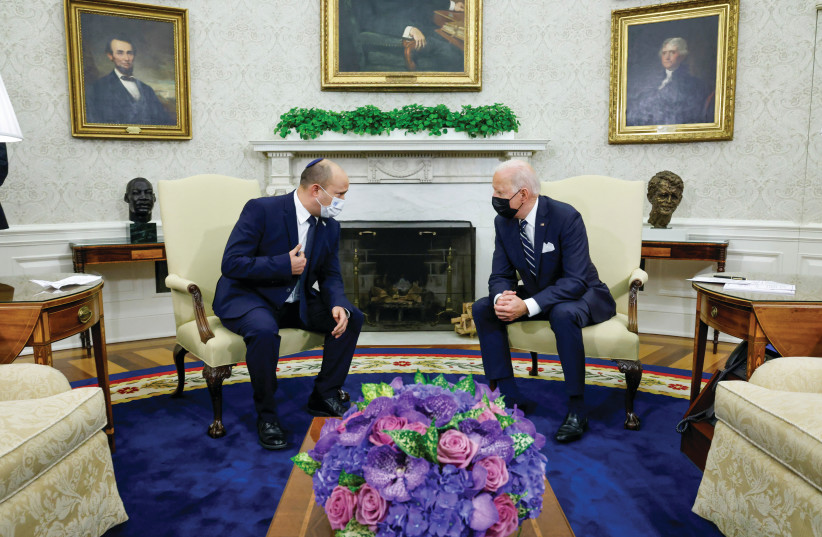WASHINGTON – Israel has gone through four elections in the past three years – and since taking office in January 2021, US President Joe Biden has worked with two Israeli prime ministers.
The current political situation signals that those might not be the last elections, and that the Israeli political system is far from being stable for the foreseeable future. How does this instability affect the US-Israel relationship when sensitive decisions have to be made, such as the Iran nuclear deal?
Jonathan Schanzer, senior vice president at the Foundation for Defense of Democracies, said that, if anything, “this could be a moment for Israel to shift its approach regarding the Iran deal.”
“Bennett’s strategy until now has been to remain relatively quiet about the deal, for fear of looking too much like [former prime minister Benjamin] Netanyahu,” he said. “Bennett may now see this as the time to begin to speak out in a louder voice, perhaps to reassert his right-wing credentials among those members of Knesset. This would probably appeal to a wide range of Israelis, even those not on the Right. The Iran deal is deeply unpopular in Israel, for obvious reasons.”
David Makovsky, distinguished fellow at The Washington Institute and director of the Koret Project on Arab-Israel Relations, said that due to the high bar for a constructive no-confidence vote, the challenge to this government is either to stay in power but have difficulty passing legislation, or hold an election.

“If [there will be a new] election, this creates a dilemma for the Biden administration,” Makovsky said. “They will want to avert any public step toward this government that could be seized upon by the Likud and create a backlash. They did this skillfully in the spring 2021 election: I expect them to do the same if there is a new election.”
While there was “no sense of indifference about who they want to emerge, overt moves, especially on the eve of midterms, could be costly,” said Makovsky. “Beyond the election calculations, it must be dispiriting for an administration to know that a casual mention of Judea and Samaria as the West Bank by Bennett is enough to kick off a firestorm by some on the right. It signifies that Bennett has no margins for moving on the Palestinian issue in Israel.”
Dan Shapiro, former US ambassador to Israel and a fellow in the Atlantic Council’s Middle East programs, said US officials “are used to conducting relations with Israel during political crises and election campaigns. The main principle is: Don’t interfere while Israel’s domestic political processes play out. Most normal business, particularly in security cooperation, can continue. While a minority government in Israel is fully empowered, in the case of elections, there may be some decisions a transition government in Israel cannot make.”
Michael Koplow, chief policy officer of the Israel Policy Forum, said he did not foresee the instability in the coalition affecting US-Israel relations in a big way, “since Bennett, [Foreign Minister Yair] Lapid and [Defense Minister Benny] Gantz are not going anywhere quite yet. And even if they were to be replaced with a new government as soon as the Knesset reconvenes in May, there will not be much difference in any conceivable Israeli government’s skepticism about an Iran deal or enthusiasm for normalization.
“The Biden administration has built an assumption about Israeli political instability into its approach as is, and has been wary of doing anything that would topple the Bennett-Lapid government,” Koplow said. “So dealing with a rickety Israeli coalition is not a new element. What may impact US-Israel relations is if Netanyahu manages to engineer his own return to the Prime Minister’s Office, not so much because of a huge policy shift but because of an attitudinal shift.”
